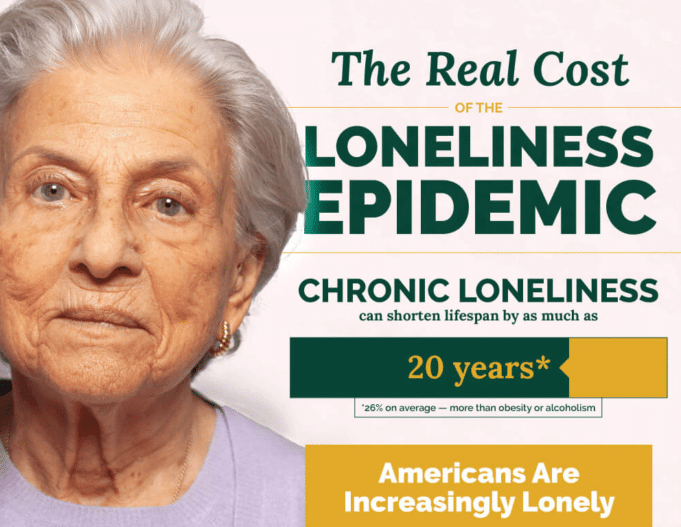Loneliness is more than just a feeling – it’s something that can affect your health and your pocketbook alike. In many places across the world, including the United States, loneliness has reached epidemic proportions.
Between 2018 and 2019 loneliness grew 7% from 54% to 61%, which means the majority of Americans report feeling lonely all or some of the time.
What’s more, loneliness can decrease lifespan by 20 years, which is more than obesity or smoking. And the pandemic has just made loneliness worse.
Western lifestyles are partially to blame for the loneliness epidemic. The expectation is that a person either lives alone or in a nuclear family, and living with an extended family is seen as a failure.
People are expected to have plenty of room for each family member, including private bedrooms for each one. The result is that people grow accustomed to having plenty of space and spending plenty of time alone.
This lifestyle is even more difficult for people who have chronic health conditions or physical limitations and disabilities. Living alone with the ability to easily go out and meet up with friends or go to work or pursue a hobby is one thing, but when there are significant roadblocks to even leaving the house this all becomes much more difficult.
77% of Americans say they lack a social support system. For most people, the most social interaction they get on a daily basis is through work or school. The people they see on a daily basis are the ones with which they have the most interaction. For people who are disabled or retired, these kinds of relationships can be virtually nonexistent.
Poor health and loneliness correlate heavily. People who are lonely have 374% higher instances of both depression and psychological distress and 278% more likelihood of poor overall health.
Loneliness increases the risk of developing diabetes, heart disease, and substance abuse disorders. It has also been shown to produce measurable increases in white blood cells leading to greater inflammation as well as increased norepinephrine levels.
For seniors, the likelihood of loneliness is increased as they leave their work friends and colleagues behind in retirement, and this loneliness can increase their risk of death by 14%.
Adult daycare is one of the solutions to this problem. Adult daycare centers provide seniors and people living with disabilities an opportunity to get out of the house. They also provide opportunities for exercise, nutrition services, social opportunities, and help connecting with needed medical services.
People with developmental disabilities, mental illness, diabetes, cardiovascular disease, physical disabilities, hypertension, dementia, and more can all benefit from adult daycare services as they provide monitoring for these conditions so people don’t have a medical emergency while they are home alone.
These services help prevent medical conditions from worsening – those who attend adult daycares have fewer ER visits and hospital admissions, and when they are admitted their stays are often shorter. It also helps to delay cognitive decline in Alzheimer’s patients.
Unfortunately the pandemic has derailed many of these services. These populations are the same ones who are at higher risk of dying from COVID-19, so sheltering at home is the safest option for them.
Many of these services are getting creative about how to keep connecting to clients to keep their needs met throughout the pandemic. Learn more about the loneliness epidemic below.













